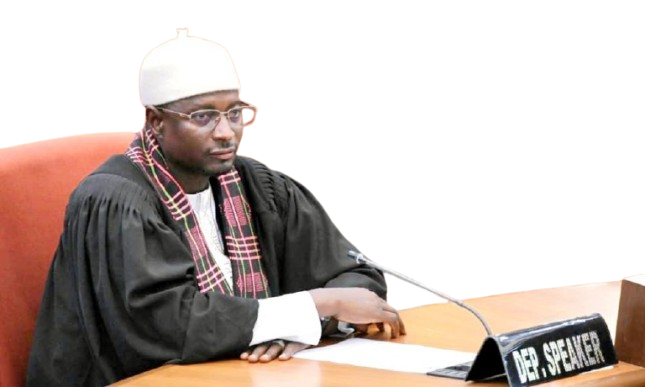Gambiaj.com – (Banjul, The Gambia) – Deputy Speaker of the National Assembly and Deputy Spokesperson of the ruling National People’s Party (NPP), Seedy SK Njie, appeared on West Coast Radio’s “Coffee Time with Peter Gomez” on Monday morning, where he was pressed on his past allegiance to former President Yahya Jammeh and the controversial remarks he made during the 2016 post-election impasse.
The show, hosted by veteran broadcaster Peter Gomez, took an intense turn when Gomez brought up the now widely circulated video clips in which Njie, then a prominent spokesperson for Jammeh’s government, declared it would be “over [his] dead body” for the longtime ruler to cede power following his electoral defeat to Adama Barrow.
Confronted with the resurfaced statements, Njie appeared visibly uncomfortable, deflecting and insisting that the matter had been “discussed enough.”
“Uncle Peter, please, let’s get to the present. We’ve talked about that enough,” he said, attempting to redirect the conversation towards current politics.
Pressed further, Njie admitted that he was serving a political party he believed in at the time, stating, “Loyalty is very important. It defines the individual.” However, he fell short of directly addressing whether his actions had undermined the will of the electorate in 2016.
“You live and learn,” Njie said. “If we have wronged individuals or the state, we unreservedly apologize and move on.”
Despite his past with Jammeh, Njie was eager to focus on his role in the formation and evolution of the NPP, which he said emerged from President Barrow’s initial grassroots movement through the Barrow Youth for National Development and Barrow Fans Club.
About the NPP and UDP being Six and Nine…
Throughout the interview, Njie firmly rejected comparisons between the NPP and the United Democratic Party (UDP), from which President Barrow defected.
“It’s false. NPP and UDP are not six and nine,” Njie asserted, in response to a widely circulated phrase used by many Gambians to describe the parties as two sides of the same coin. “It is millions of miles away on the planet Pluto from being the same.”
He accused the UDP of being a party of “intimidation, ridicule, and tribalism,” claiming that NPP is instead committed to social democracy, inclusivity, and infrastructure-led development.
Njie said the UDP had its chance between 2017 and 2022, when it held a parliamentary majority, to enact sweeping legal and democratic reforms but “chose to only amend the age limit” to allow party leader Ousainou Darboe to run for president.
Addressing criticisms that President Barrow has become increasingly authoritarian and sought to entrench power through the 2024 draft constitution, Njie dismissed such claims as “ignorant.”
“There is not a single provision that promotes dictatorship,” he said, adding that the Barrow administration is committed to due process and democratic governance.
Njie also fiercely defended the government’s infrastructure push, touting road and electricity expansion in previously underserved areas like Nianija. He claimed critics alleging corruption in infrastructure spending lack evidence, and he warned that voters would not be swayed by “flimsy” accusations.
“If they go to Hakalang or Saloum and tell people not to vote for Barrow because of roads, they will be chased away,” he said.
As the 2026 elections draw nearer, Njie projected confidence that President Barrow and the NPP would be re-elected with what he described as a “decisive, emphatic victory.”
But the interview revealed the discomfort still surrounding the events of 2016 and Njie’s role in them — a past that continues to shadow his political future despite efforts to pivot to a new chapter.










